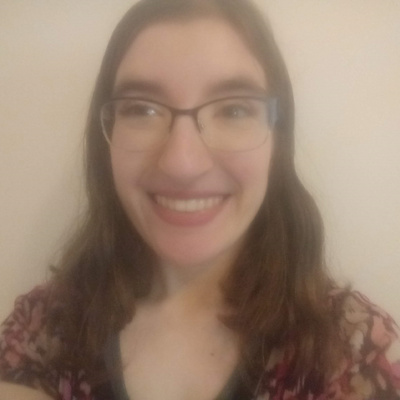In International Waters: Sail Through Circus with Veera Kaijanen

The CircusTalk talent pool has amazing circus artists and career performers from around the globe– a group with too many accomplishments to count. That’s why each month, we get to know an artist and let them share wisdom from their careers with you. Our featured artist for March is Finnish-based tightwire and hula hoops artist Veera Kaijanen, who offers advice to fellow performers on booking international contracts and reaching for the stars while finding something to ground themselves in here on Earth.
The sky’s the limit in circus… but after the show ends, it helps to have one’s feet on solid ground as a career performer. Veera Kaijanen knows this fact well. An innovator with both the hula hoops and tightwire, Veera believes in constant self-improvement; she has been honing her elegant style and skillset since she first discovered hula hoops at age four. Decades later, her performance resume spans companies, countries, and continents. She’s toured with Cirque du Soleil‘s Amaluna show, appeared in venues like France’s Compagnie Tempo— and, most recently, she’s taken to the seas with a cruise show contract on the MSC Grandiosa. All the while, she continues to challenge herself and negotiate that delicate balance between artistry, ambition, and pragmatism.
Now on the water, Vera takes a moment to answer our most pressing questions.
Right now you’re an artist onboard the MSC Grandiosa. How does performing on a cruise ship differ from the work you’ve done in theaters and tents?
I feel that working on a cruise ship is very similar to contracts on dry land… and at the same time, not at all. The performing part itself reminds me of touring with Cirque du Soleil mixed with some of my past contracts at hotel resorts. On the other hand, life on board is very different from normal life— very specific, I could say. Especially now, during pandemic times, the regulations and rules are very strict, and it’s a must to follow them. It sounds like a lot… but when other shows got closed down this winter, ours kept on sailing, and that’s because of all the rules we follow.
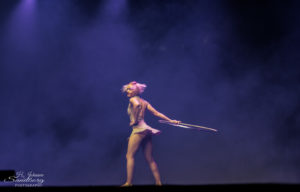
Before coming on board, we had to pass a seafarer’s medical exam and file a huge amount of paperwork. Everyone here must follow Covid-19 safety protocol. For example, I am currently not allowed to take shore leave— which means that, whenever we arrive at port, I cannot get off the ship. I arrived in mid-December and have been on board ever since. We follow a very specific dress code in public areas and do regular safety training; we learned, for example, what happens if pirates hijack the ship, or there’s a fire. These kinds of small things can add up and easily become very heavy. I find it important to be mentally prepared before joining a cruise show. If you don’t like them, better not to come; simple as that.
Performing here is great. We get to work in a beautiful theatre, originally built by Cirque du Soleil. The audience has been great as well: very encouraging, and they seem to enjoy the shows night after night. We run two shows with very different styles. Right now, I play a character in each show as a hula hoops solo act, and I’ve had the chance to decide the tricks that go into my routine. One show had already been created for us. We have had the honor of getting to build the other show ourselves as the original cast, writing our characters and acts together. Being a part of that is always something very special.
What inspires you to innovate and learn new things in your main disciplines, hula hoop and tight wire?
I feel like, at some point, we as performers reach a level where the work becomes easy and feels light. Myself, I absolutely love that moment because, from then on, freedom starts. I love to find ways to break the traditional rules of my disciplines, to break up the lines of my body and my poses. I love to redefine my signature way of executing movements and doing my work.
Also, finding work is not easy– especially during a pandemic. Booking contracts at the international level is tough, and competition is big. But I still have that drive to perform, and if I want to be able to perform at my top level, I have to keep working at it. Top-level acts do not come for free.
How do you push your boundaries as an artist?
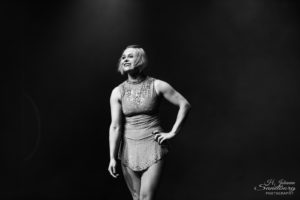
Ahaha, I have this bad habit of never being satisfied. Somehow, every time I reach a certain level of security, safety, or technical excellence, I see the next goal post before my eyes. And, secretly, I both love and hate to push myself out of my comfort zone. I guess it is something that, when you do it enough often, it does not feel that scary anymore. The more times I venture out of my comfort zone, the more rewarding it becomes.
What are some examples of your self-care routine?
I am an older artist—30+ already— and I would not have gotten this far if I had not taken good care of my body and mind. On a daily basis, whether in-studio or during show season, I do a lot of physiotherapeutic exercises, conditioning and stretching to support my body. I try to keep the number of repetitions I do consistent, especially during show season, so that it does not make me feel unnecessarily tired. For example, if I’m working out my leg muscles, 20 reps an exercise would not be enough for me, but at 40-50, I’d start to buckle. 30 is the perfect balance to leave me feeling active and energetic.
I fit all my physical work into one or two time slots per day. A lot of my exercises are built into my show warm-ups; then I can work the act itself, and when the show finishes, my body can stop its work as well. I’ve noticed that doing too many warm-ups and training sessions per day does not work well for me in the long run.
I also take extensive care of my mental health, collecting ‘tools’ that I carry with me and use. Whenever times get stressful or the unexpected happens, I have my go-to people that I know I can reach out to and ask for guidance. I find it is very important to have courage, to ask for help and support. Not always an easy thing to do, but very necessary.
How has the pandemic affected your work?
The pandemic has had a huge impact on my work, positive and negative. I’ve lost a lot of money. Time to time, I find myself feeling very stressed, and see myself as having almost no safety net if something unexpected happens. My nerves are very tight, I could say.
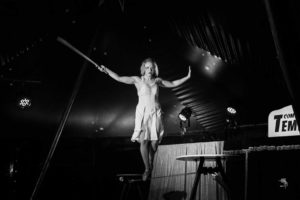
On the bright side, the pandemic forced me to do a huge self-checkup. I asked myself all these questions, like, what do I want from my life? Where do I want to go these next few years, and what are my future goals? That put me on a fresh track and helped me grow a lot as both a human being and a performer. I’ve found this new, relaxed way to live my life, and I am loving it!
I also have to say that I’ve been very lucky, despite all the craziness. In Finland, I was able to keep on training daily. (A huge thank you to the Skillz Gym cheerleading hall in Helsinki for welcoming us performers to use their space!) Besides that, I’ve been working pretty much nonstop. But the way the bookings go now is different than in the pre-pandemic world. Everything happens at the very last minute, and I can not be afraid to jump into an adventure with 72 hours or less of warning.
What are your hobbies outside of the circus?
In my free time, I love visiting art museums, seeing shows, and browsing the cities I’m currently working in. During the pandemic, I studied languages and marketing. I am very interested in the stock market, day trading and investing. It keeps me busy, and I find it is a perfect way to not waste my performance salary and build a post-career plan for myself. Also, I go horse riding whenever I can, and paint and draw. And I watch way too much Netflix… more than I would like to admit, hahaha.
What’s the best piece of advice you’ve received in your career?
The best two pieces of advice that I’ve gotten were actually very direct comments: ‘Just get over it.’ The other one was, ‘Think something else.’
They both sound very harsh when taken out of context, but they can do miracles when the moment is right. I naturally get stressed a lot and worry about unnecessary things. Those two sentences have helped me to stay strong and keep going.
What advice do you have for artists at the start of their careers about finding jobs?
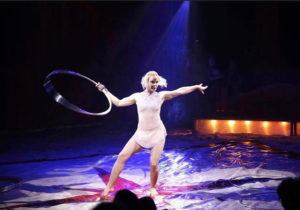
The start of your career is tough. But never be afraid of tough times. The key is to be active: do research, and put yourself out there. No one will come to find you in your living room— people most likely do not even know that you exist. You know what I mean. Be polite, be smart, listen well, and keep your eyes open. Go out and see shows, then go to meet people and send them your videos. Keep on working, keep getting better and making progress with yourself.
I also recommend doing a regular self-checkup, considering what you actually need to be able to master your work and get better bookings. Do you need to reach the next technical level? Or should the act be cleaner, and your lines be better? How about the music and costume?
And, most importantly, never be arrogant; stay humble. Be kind, yet strong.
Images shared by Veera Kaijanen. Photography credits to H Johanna Sandborg.
Editor's Note: At StageLync, an international platform for the performing arts, we celebrate the diversity of our writers' backgrounds. We recognize and support their choice to use either American or British English in their articles, respecting their individual preferences and origins. This policy allows us to embrace a wide range of linguistic expressions, enriching our content and reflecting the global nature of our community.
🎧 Join us on the StageLync Podcast for inspiring stories from the world of performing arts! Tune in to hear from the creative minds who bring magic to life, both onstage and behind the scenes. 🎙️ 👉 Listen now!
